Dental Implants — Sterling Heights, MI
Superior Prosthetics
for Missing Teeth
With dental implants, our team can easily replace one, multiple, or an entire arch of teeth. Using advanced dental technology and high-quality materials, we can position your smile for optimal functionality, clearer speech, and the ability to enjoy a better quality of life. If you’d like to learn more about dental implants and the impact they can have on your smile, contact us to schedule a free consultation!
Why Choose Forever Young Dentistry of Sterling Heights for Dental Implants?
- Free Dental Implant Consultation
- CT/Cone Beam Scanner & Guided Implant Surgery
- Titanium, Ceramic, and Zirconia Implants Available
What Are Dental Implants?
Dental implants are small prosthetics that look similar to tooth roots. When placed within the jawbone, they fuse over time through a process known as osseointegration. They create a solid foundation for a metal abutment and customized dental crown, bridge, or denture, which sits atop the post to complete the root-to-crown structure. Dental implants can be made from titanium, ceramic, or zirconia, and are known for their stability, functionality, and longevity.
The 4-Step Dental Implant Process
Compared to dentures or bridges, the process for dental implants is more complex. That means the entire treatment can take months to perform. Still, you can rest assured – implants are well worth this time and effort! Forever Young Dentistry does the placement in-house, so your new prosthetics will benefit from our dentists’ skills. As such, you can expect four main steps from the procedure: consultation, surgery, osseointegration, and delivery of final restoration.
Initial Dental Implant Consultation

Before you undergo implant surgery, you’ll consult with our dentists. This talk will help them grasp your smile goals, dental history, and general health. Based on such factors, they’ll then decide if you’re a good implant candidate.
If you don’t qualify for implants (at first), don’t worry. Our office can help you receive preliminary procedures – gum disease therapy, tooth extractions, etc. By getting these services, your mouth will be strong enough to handle implants.
If we approve implant work, the consult will also outline your treatment details. Such facts will include procedure timelines, costs, and more.
Dental Implant Surgery

As it happens, our office places implants in-house. We don’t refer patients to outside specialists. For that reason, your surgery won’t involve any extra travel. Our team will manage things and restore your full grin.
Typically, implant surgery takes the following measures:
- Numb the Area – Before placement, we’ll numb your mouth with an anesthetic. This action ensures you won’t feel pain from the procedure.
- Make a Gum Incision – After numbing the treatment site, we’ll make a small incision in your gums.
- Place Implant Posts – Once the incision is made, we’ll place your implant in the proper jaw socket.
- Close the Gums – We’ll close your gum incision following the implant placement. From there, we’ll put a small cap over the implant post.
Dental Implant Osseointegration & Abutment
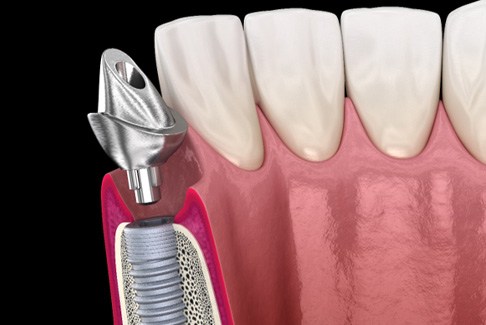
With the surgery over, your implant(s) will slowly fuse with your jawbone. (The medical term for this process is osseointegration.) However, the fusion will take six months to finish. Only then will your implant(s) be as secure as your other teeth.
Soon after the implant fusion, you’ll undergo surgery that places your abutment. This latter part is a connector that holds your implant’s toothlike portion. As you adjust to the abutment, a dental lab will craft your final restoration from prior impressions of your teeth.
Delivery of Dental Implant Restoration(s)

When you’ve adjusted to your abutment, you’ll return to our office for your final restoration. This prosthetic is usually a crown, dental bridge, or denture. Which of the three you get will depend on how many implants were placed.
Luckily, it won’t take our dentists long to fit this restoration. They’ll simply apply some dental cement and confirm that everything works well. (At most, they might make a few last-minute alterations.) Afterward, they’ll give you the all-clear to enjoy your newly restored, gorgeous grin!
Benefits of Dental Implants

More than 500,000 dental implants are placed every single year! This is because they present unique benefits that you can’t find elsewhere. Thanks to their unique placement in the jawbone, dental implants are a preferred tooth replacement option by dentists and patients alike! Continue reading to learn some of the ways that dental implants can improve your confidence, health, and quality of life.
Day-to-Day Benefits

As soon as your gums and jawbone have completed the healing process, you shouldn’t be able to tell the difference between your implants and your natural teeth. You might even forget that they are there! Here are some of the benefits that you will notice every single day:
- Easy to Maintain: There isn’t a special way to care for dental implants. You just use all of the same practices as you would for natural teeth. Brush twice, floss, and rinse every day. You should also continue to see your dentist for cleanings and checkups.
- Stronger Bite: With dental implants, your bite force can be restored up to 90%! This is much more than you can expect with traditional bridges and dentures.
- Increased Self-Esteem: If you have gaps in your smile, it can be easy to feel self-conscious. With dental implants, you can show off your smile with pride!
Health Benefits

Dental implants positively influence your health. Here are some of the ways that dental implants can benefit your well-being:
- Improved Dental Health: Missing teeth increases your risk of further dental problems. This includes gum disease, misalignment, and additional tooth loss. Dental implants also help to prevent these negative effects.
- Better Overall Health: Dental health and general health go hand-in-hand. Having better dental health means a reduced risk of several life-threatening conditions, like diabetes and heart disease.
- Prevents Bone Loss: Your jawbone isn’t being stimulated through regular chewing when you are missing teeth. Fortunately, dental implants replace the roots of the missing teeth, therefore stimulating the jawbone and preventing bone loss.
Long-Term Benefits

Dental implants have a higher cost than traditional dentures and dental bridges, but there are good reasons for this. Dental implants are an investment in the future of your smile. Here are some of the benefits that you can experience for many years into the future:
- Highly Successful: Dental implants have an astonishing success rate of over 95%. Dental implant failure is highly unlikely.
- Long-Lasting: Other tooth replacement options, like dentures, need to be relined or replaced periodically. However, dental implants are made to last for many decades or even the rest of your life. You may never need to worry about your missing teeth again.
- Save Money: Dental implants last for a long time, so you don’t need to worry about spending large sums to replace or repair them periodically. Implants also help to prevent health issues that are costly to treat. Ultimately, you can take the pressure off your wallet.
Who Dental Implants Can Help

Dental implants have skyrocketed in popularity largely because they are the only tooth-replacement option that replaces both the root and crown. Of course, they are also widely loved and used because they can replace one, a few, or an entire arch of missing teeth. In other words, if you are ready to address tooth loss head-on with dental implants, don’t hesitate to schedule an appointment with our Lenox dental team to find out if you’re a candidate. In the meantime, you can read on to learn more.
Who Is a Good Candidate for Dental Implants?

In order to find out if you’re a good candidate for dental implants, our team at Forever Young Dentistry needs to conduct a comprehensive oral exam. That way, we can determine the density of your jawbone, see if any preliminary procedures, like a tooth extraction, are necessary, and make sure you’re willing to commit to good oral hygiene habits both now and in the future.
If you aren’t a candidate for dental implants, don’t worry – that doesn’t mean that you’ll just have to accept the consequences of tooth loss. We will review the other treatment options, like traditional dentures, with you to ensure that you have a complete, healthy, and beautiful smile again.
Missing One Tooth
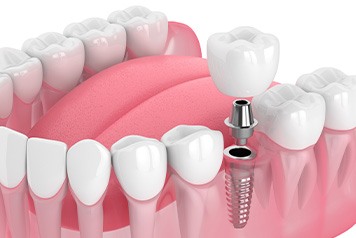
If you are missing one tooth – whether it’s one of your molars or one of the teeth that show when you smile – dental implants are an option. In fact, we can replace both the root and the crown of your tooth, ensuring your restoration looks and feels just like the real thing. One of the best parts is that – with proper care – the results can last for 30+ years. So, if your confidence and diet have been restricted following tooth loss, don’t wait any longer; schedule a consultation with us to discuss dental implants!
Missing Multiple Teeth
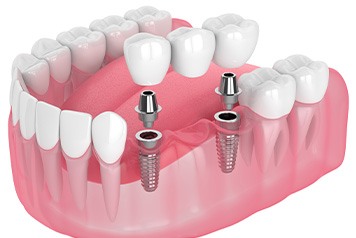
Are you missing 2-4 teeth in a row? Are you missing several teeth throughout your mouth? If so, you’ll be happy to know that we have a solution for you: dental implants! With this state-of-the-art solution, we can replace several teeth consecutively or multiple teeth throughout your mouth. Since they are inserted directly into your jaw, you don’t have to worry about unexpected slipping either. They will stay securely in place while you’re laughing, eating, or talking.
Missing All Teeth
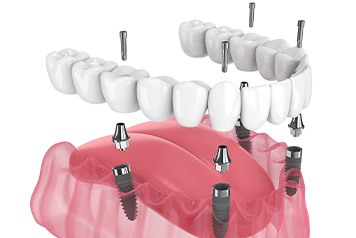
If you don’t have any of your natural teeth left, implant dentures might be the solution you’ve been looking for. Like traditional dentures, implant dentures can give you a completely new smile. However, there is one important difference: they are secured in place with strategically placed implants. This adds to their lifelike appearance, restores some of the strength of your bite that was lost, and boosts their longevity. So, don’t just assume traditional dentures are your only option – ask us about implant dentures!
Sinus Lifts

When teeth are missing toward the back of the upper arch, you may need a sinus lift. This outpatient procedure involves lifting the maxillary sinuses and incorporating grafting bone into the area to create an anchor for the implant. Once you’ve recovered, we will move forward with implant placement.
Bone Grafts

When there is a lack of jawbone in a particular area of your mouth, a bone graft will be necessary. Adding grafting materials from another part of your body or a donor will help to strengthen the area over time, allowing the future implant to fuse with the bone.
Understanding the Cost of Dental Implants

Since every mouth is different, the overall cost of dental implants in Sterling Heights will depend heavily on each patient’s specific needs. This tooth replacement treatment does typically come at a higher initial price than other restorative solutions. However, due to benefits like having three times the lifespan of traditional restorations, this option can save you money in the long run. We’ll be able to assess your oral health and provide you with an estimate of the price of your treatment during your initial consultation, as well as your financing options. Read along to learn more about the cost of dental implants!
Preliminary Treatments & Dental Implant Surgery

Several factors go into the overall price of dental implants. For instance, we’ll first need to see if you’re eligible to begin the procedure or if you’ll require preliminary treatments, such as a bone graft or gum disease therapy. These processes can add to the final cost of your dental implants, but they’ll be essential for ensuring a lifelong tooth replacement solution.
The price of the surgery will also involve a few components. These can include the location in your mouth where your implants will be placed as well as the type of sedation dentistry used. Fortunately, our team is proud to offer the entire dental implant treatment in-house, saving you time, trouble, and money from needing to travel to visit a specialist.
The Parts of Your Dental Implant

Here are several aspects that can influence the overall price of the dental implants themselves:
- Type of restoration – Your dental implants will support custom-crafted crowns, bridges, or dentures, each with its price range.
- Size or material – Dental implants can be made of various materials, such as zirconia instead of titanium. Their sizes can also vary, which will significantly affect the cost.
- Number of dental implants – The more metal posts you require, the higher the overall price.
- Brand of dental implant – Several companies manufacture dental implants, and our team will only use the highest-quality products to effectively restore your smile.
How Dental Implants Can Save You Money

While many patients hesitate to get dental implants due to the higher upfront cost, you should remember that this treatment will typically involve a one-time payment. Unlike traditional restorations which have to be replaced every few years, you can expect your implants to last several decades to a lifetime! In turn, this can save you hundreds of dollars in the long run. You also won’t even need to buy special cleaning products or adhesives since your new pearly whites will only require regular dental care to maintain.
Does My Dental Insurance Cover Dental Implants?

Dental insurance companies don’t typically cover dental implant procedures. That said, policies can vary from patient to patient, and some of them can offer coverage for portions and percentages of the process. Your consultation, preliminary treatments, and restoration can typically receive partial coverage. That’s why you’ll want to speak with your provider or consult our knowledgeable team so we can help you navigate your insurance plan and maximize your benefits.
Making Dental Implants Affordable

Even if you don’t have dental insurance, you may be able to explore alternative financing options. Our team offers an in-house membership plan that can provide discounts on numerous services, including your dental implant procedure. We’re also proud to work with CareCredit—a third-party financier that can help split up the overall cost of treatments into smaller, monthly installments. Plus, many of their plans come with little to no interest, meaning you won’t have to empty your wallet to receive the tooth replacements you deserve!
Dental Implant Failure & Salvage

Dental implants have all sorts of incredible benefits. One of the most prominent ones is that they have an astonishing success rate of over 95%! However, failure can still happen on rare occasions, so it’s important to be aware of the signs so you can take action. If you notice that your dental implant is loose or painful, or you have other concerns about it, don’t hesitate to give us a call. We may be able to save your replacement tooth with dental implant salvage treatment!
Learn More About Dental Implant Failure & Salvage
Dental Implant Post-Op Instructions

Your dental implant treatment won't wrap up when surgery is over. At that point, you still need to recover from the placement process. Doing so ensures your new implants will work properly. As for how to go about this healing, we at Forever Young Dentistry can help. You’ll find a few vital dental implant post-op instructions below; using them will lead to a full recovery. For more details, simply keep reading or call us soon.
What to Do Directly After Dental Implant Surgery

Once implant surgery is over, leave the forming blood clot alone. Ignoring this rule will delay or even reverse your recovery. So, make sure you:
- Don’t spit; swallow any saliva or use a tissue for dabbing if necessary.
- Avoid using straws, as their suction force can dislodge your blood clot.
- Don’t smoke on the day after your implant surgery.
- Keep your fingers and tongue away from the surgical site(s) for a few days.
Common Side Effects When Recovering from Dental Implant Placement

You may have some side effects after your implant placement. The most typical of these are:
- General Discomfort – The implant site may ache a bit following your surgery. To ease this soreness, use store-bought pain relievers.
- Intermittent bleeding – Your treatment site could bleed slightly after placement. Should that happen, use gauze and light pressure to lessen the bleeding.
- Gum or Facial Swelling – In the first 72 hours post-surgery, your gums and face could swell. Use a cold compress to reduce this symptom as needed.
Of course, the above effects are temporary; they’ll fade after a few days. Please let us know if that isn’t the case for you.
Your Diet After Dental Implant Surgery

You should only eat soft foods in the first few days after implant surgery. If you chew anything tough, you could dislodge your blood clot and reverse your recovery progress.
For this “soft food diet,” consider having items like:
- Scrambled Eggs
- Yogurt
- Soft Cheese
- (Non-hot) Soup
- Mashed Potatoes
- Sweet Potatoes
- Pasta
- Pudding
You can resume your normal diet when you feel ready. However, do make sure to go easy on crunchy and tough foods. Please don’t chew directly on the implant site(s), either.
Post-Op Health & Oral Hygiene

Your mouth needs daily cleaning even as it heals from surgery. In other words, you should practice good oral hygiene while you recover. Still, make changes to the relevant routines as well.
For instance, keep brushing your teeth twice daily. Doing so protects the treatment area from plaque. That said, brush gently when you near the surgical site. Using too much force could dislodge your blood clot.
Similarly, continue to rinse your mouth often. It can reduce your post-surgery inflammation. Even so, switch out your regular mouthwash with twice-daily saltwater rinses. Using an oral rinse with alcohol content will disturb the implant site.
What to Do After Your New Teeth Are Attached

The hard part is over when your new crown, bridge, or denture is attached. By then, the most you’ll face is minor gum sensitivity – a symptom that fades quickly. You shouldn’t experience any nasty effects beyond that. Rather, you’ll be ready to enjoy your full smile!
Maintaining & Caring for Your Dental Implants
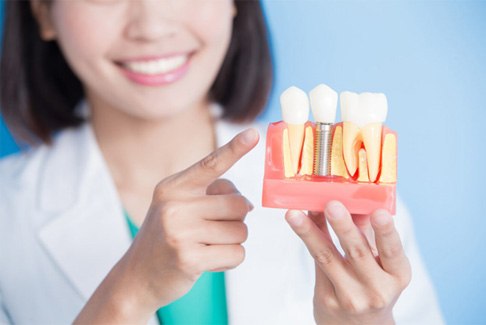
After receiving dental implants in Sterling Heights, you’ll feel thrilled at the prospect of having a restored smile for the foreseeable future. However, your implants can only last and function as intended if you’re diligent about maintaining them. Fortunately, your implants also don’t require any specialized care, and it’s quite easy to ensure that they’re given a clean environment and capable of serving their purpose for several decades. Here’s a quick breakdown of several things you can do to ensure that your dental implants last.
Make Oral Hygiene a Priority

Even though your dental implants themselves can’t get cavities, you still need to prioritize your oral care since your remaining natural teeth, gum tissue, and jawbone are all still susceptible to problems. Be sure that you’re brushing twice a day, flossing daily, and also rinsing with an antibacterial mouthwash. By regularly cleaning your mouth of debris and bacteria, you’re creating a healthy environment for your implants that encourages the posts to remain sturdy and secure for several years to come.
Eat a Healthy Diet
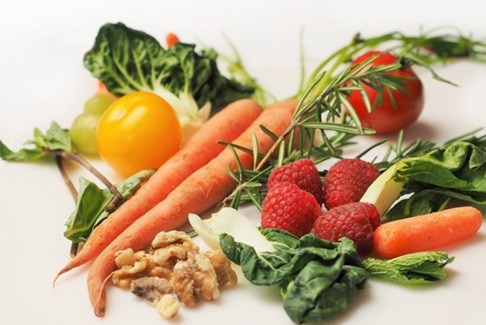
Many patients are thrilled to begin eating all of their favorite foods again after receiving their dental implants; after all, implants are capable of restoring an impressive 80% of one’s natural chewing power! That said, it’s still wise to consider the dietary choices you’re making, as things like sugary sweets can lead to problems for your implants (or your oral health in general) if you’re prone to overindulging. Hard or sticky objects can also potentially damage your implants. If you can, add plenty of healthy choices into your diet such as vitamin-rich fruits and vegetables, lean proteins, low-fat dairy products, and more. It’s also recommended to drink plenty of water, as it’s the best beverage for your oral health and therefore, your dental implants!
Break Bad Habits

Dental implants are quite tough, but they will not last if you aren’t able to break bad oral habits that might harm them. Try to cut the following habits from your life:
- Smoking and using tobacco – Smoking can interfere with osseointegration (the fusion between implant and jawbone) and make your teeth vulnerable to infection, both of which increase the risk of dental implant failure.
- Using your teeth as tools – Holding objects with your mouth or using your teeth as tools to open packaging is a surefire way to damage your implants.
- Chewing on hard objects – Biting hard items like fingernails, pens and pencils, and even ice cubes can quickly wear down the surfaces of your dental implants or possibly damage them.
Protect Your Dental Implants

If you participate in sports or physical activities where there’s an increased risk of facial trauma, you should consider investing in a mouthguard to protect your implants. These nifty devices are easy to use, effective against hard hits, and quite comfortable to wear. If you’re susceptible to bruxism, (teeth grinding), you can also request a custom nightguard appliance; if unaddressed, bruxism can lead to your implants wearing down and loosening over time.
Schedule Regular Dental Checkups

Regular preventive dental care is undoubtedly one of the best ways you can ensure the integrity of your dental implants moving forward. Visiting us twice a year will allow us to inspect your implants for underlying oral health issues so that you can rest assured there’s no threat to your newly restored smile. Gum disease, for example, often poses a serious threat to implants as well as the surrounding mouth tissue—but it’s easily mitigated through preventive dental care!
Dental Implant Technology

Forever Young Dentistry is dedicated to offering patients the most comfortable, efficient, and effective treatments available. To achieve this, we use the latest technology and stay current with the most successful dental implant techniques. Our specialized dental instruments ensure more precise and durable tooth replacements, minimizing surprises throughout the process. If you’d like to learn more about the advanced dental implant technology we use in Sterling Heights, click on the button below.
3D Cone-Beam Imaging/ 3D CT Scanning

Dental implant treatment starts with careful planning. Our team takes a careful and deliberate approach, ensuring thorough preparation before proceeding with the procedure. We meticulously map out the placement of implants, taking into account the locations of blood vessels and nerve endings to prevent any potential complications. Our advanced cone beam CT scanner captures detailed 3D images of your oral cavity, revealing structures that traditional X-rays cannot. This allows us to plan the procedure with precision, aiming for optimal results and minimizing risks.
Guided Dental Implant Surgery
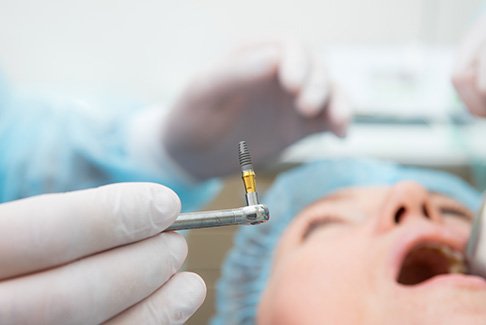
Our team has extensive experience and training in conducting dental implant placement surgery. Precision is critical in this procedure, where even the smallest deviation can impact outcomes significantly. That's why we rely on guided implant surgical technology to ensure precise placement every time. This advanced technology minimizes the risk of errors, potentially speeding up recovery and enhancing the likelihood of successful treatment.
Digital Impression System
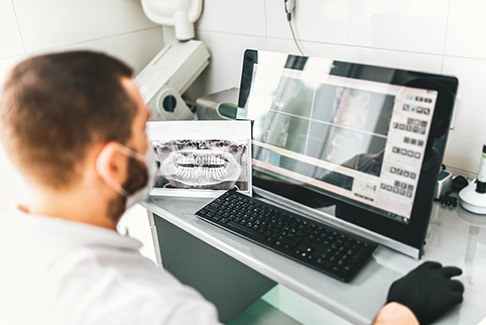
Once the implant post has fully integrated with the jawbone and the abutment has been placed, our focus shifts to restoring your dental implant. Traditional impressions involve using a putty-like substance pressed against your upper and lower arches, a process that can be sensitive and prone to inaccuracies if not executed perfectly. This method often leads to discomfort for patients.
Our practice will prioritize your comfort and satisfaction by using a digital impression system. This modern approach involves a small device scanning the inside of your mouth to capture precise measurements. This ensures that your restorations fit accurately the first time, providing a more pleasant experience overall.
Dental Implant FAQs

Dental implants are considered by many dentists to be the modern gold standard for replacing teeth. If you are thinking of using dental implants to rebuild your smile, get in touch with our team today! We’ll answer any questions you might have about the implant process so that you can decide whether it’s the best choice for you. For your convenience, we have answered some of the questions we’ve commonly heard in the past down below.
How Long Do Dental Implants Last?
The answer will vary depending on your overall health and the kind of care you give your implants regularly. To help your dental implants last as long as possible, remember to brush, floss, and rinse at least twice a day. You also need to keep up with your regular checkups and cleanings so that we can identify and address any problems before they put your implants at risk. With the right maintenance, dental implants can last for three decades or more – far longer than traditional bridges and dentures.
Does Getting Dental Implants Hurt?
While dental implant placement does require surgery, your mouth will be numbed with a local anesthetic to keep you comfortable. Sedation can also be used to further reduce your ability to register pain.
After the procedure, you can usually expect your mouth to be sore for a few days. If need be, you can manage the discomfort with over-the-counter or prescription pain medication. You can also hold a cold compress against your jaw for 15 minutes at a time. Your pain should start to improve after two or three days; if it gets worse instead, call our office immediately so that we can figure out what steps you need to take next.
What Can Cause Dental Implants to Fail?
Dental implants have a success rate of over 95%, but it’s still important to take note of the risk factors that can lead to failure. Usually, the problem is related to peri-implantitis, which is a type of gum disease that can damage the bone and gum tissue supporting the implant post. In other cases, your implant might fail to join with your jaw; this can happen if there isn’t enough bone density in the area.
The good news is that implant failure is avoidable. We’ll take a number of precautions to ensure your procedure is a success, and we’ll give you guidelines for taking care of your implants afterward to lower the chances of any problems occurring.
What is the Right Age for Dental Implants?
If a dental implant is placed in a jaw that hasn’t finished growing, it could interfere with bone development. For this reason, dental implants are not recommended for children. The minimum age is usually 18, but some patients may have to wait until their mid-20s for their jaws to be developed enough for implant surgery. There isn’t an upper age limit for dental implants, but it should be noted that seniors are more likely to suffer from health issues that can interfere with the implant process.

